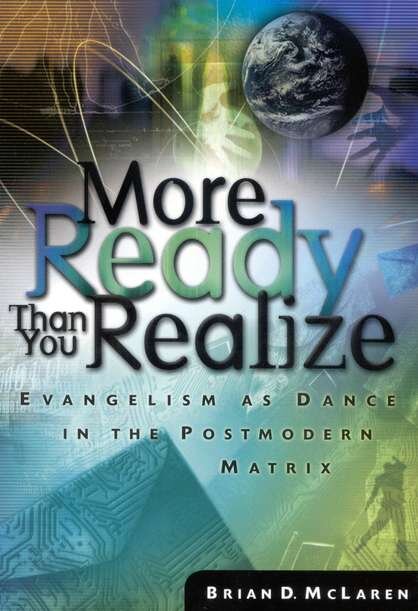Brian McLaren, More Ready Than You Realize: Evangelism as Dance in the Postmodern Matrix. Zondervan, 2002.
Referenced in: Theology and Practice of Evangelism – Emergent
LifeandLeadership.com Summary
McLaren is perhaps the chief exemplar of Emergent authors on the subject of evangelism. As such, he stresses evangelism that is a relational, conversational, community-based, holistic, and non-propositional exchange of stories between people as they traverse their faith journeys. There is also less focus on conversion as on mutual learning, whereby both parties evangelize each other, sometimes resulting in a kind of “reverse evangelism.” Authors like McLaren have much to offer in helping church leaders understand the realities of communicating the gospel in the postmodern context. Yet in some respects their approach may be overly accommodative, and should be balanced with authors who are culturally sensitive yet non-emergent. See also the interpretive essay on Evangelism in the Postmodern Ethos. Even with these caveats, McLaren offers so helpful insights that when read with discernment make a useful contribution to church leaders trying to understanding “evangelism in the postmodern matrix.”
In the opening section, McLaren describes the kind of evangelism his book is written to encourage:
“Good evangelism is the process of being friendly without discrimination and influencing all of one’s friends toward better living, through good deeds and good conversations. For a Christian like myself, evangelism means engaging in these conversations in the spirit and example of Jesus Christ.
If you know anything about Jesus at all, you probably know that he was an amazing conversationalist. Unlike the typical evangelist-caricature of the late twentieth and early twenty-first centuries, Jesus was short on sermons, long on conversations; short on answers, long on questions; short on abstractions and propositions; long on stories and parables; short on telling you what to think, long on challenging you to think for yourself; short on condemning the irreligious, long on confronting the religious.
This is the kind of evangelism we are going to explore in this book. Evangelism in the style of Jesus; evangelism that flows like a dance.” (15)
He then continues with the metaphor of the dance. He says evangelism as dance begins in much the same way as when you hear a song for the first time, and then the next, until eventually it “finds its way into your soul and begins to play there,” and you wonder where it came from and how it got there. He says,
“The gospel comes to you not like a commercial on the radio or TV or a political slogan in campaign or a scientific formula in a classroom, but like a song. It sneaks up on you, and then sneaks inside you. …The music captures your hear with its rhythm, melody, ambience, and glory, and you begin to move to its rhythm. Thus you enter the dance.
Over time, your whole life begins to harmonize to the song. …They lyric gradually convinces you that the entire world was meant to share in this song with its message, its joy, its dance.” (16)
McLaren is quite compelling with this vision of evangelism as dancing and inviting others to dance along. He carries this metaphor through the entire book.
Like most emergent authors, McLaren has great disdain for the way evangelism has been so “bastardized” (12) by those who approach it as a means to pressure others, shove things down people’s throats, or offer rehearsed and mechanical sales pitches through “Nutrasweet smiles and over-done eye contact.” (12) He argues that it is not evangelism, but these late twentieth-century styles of evangelism that we should avoid. By contrast, he offers is a very sensitive, realistic, and spiritually authentic way to join others as “messengers of grace, carriers of good news, secret-agent angels, case studies in God’s power to change, enrich, fill, and rescue lives that were being wasted, ruined, self-sabotaged?” (13)
Most current authors on this subject, both emergent and non-emergent, glean from McLaren. He is one of the best representative of his perspective, and deserves a thoughtful perusal. For a more structured model of what McLaren describes, see Rick Richardson’s Reimagining Evangelism.
From the Publisher
WARNING: This is not just another book on evangelism. This book contains fresh, encouraging, challenging, groundbreaking, and doable ideas you’ll want to share with your pastor, your small group or class, your board, or your parachurch organization.
OUT: Evangelism as sales pitch, as conquest, as warfare, as ultimatum, as threat, as proof, as argument, as entertainment, as show, as monologue, as something you have to do.
IN: Disciple-making as conversation, as friendship, as influence, as invitation, as companionship, as challenge, as opportunity, as conversation, as dance, as something you get to do.
You’re more ready for this than you realize, and so are your friends!
About the Author
Brian D. McLaren (M.A. University of Maryland) is an author, speaker, pastor, and networker among innovative Christian leaders, thinkers, and activists. From 1986-2006, he was founding pastor of Cedar Ridge Community Church, an innovative nondenominational church in the Baltimore-Washington region.
***For additional information on this resource, including reviews, click the bookstore links. Check the reference at page top or the links below for resource guides on related topics.***
Related Areas
See Other Resources on Evangelism:
See Resources on Over 100 Areas of Ministry Leadership:


